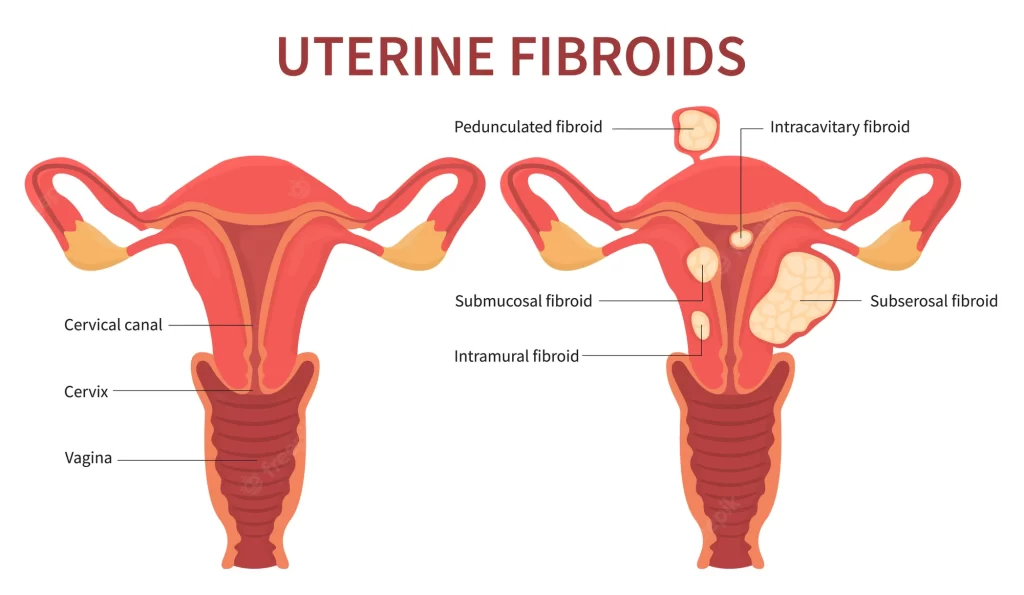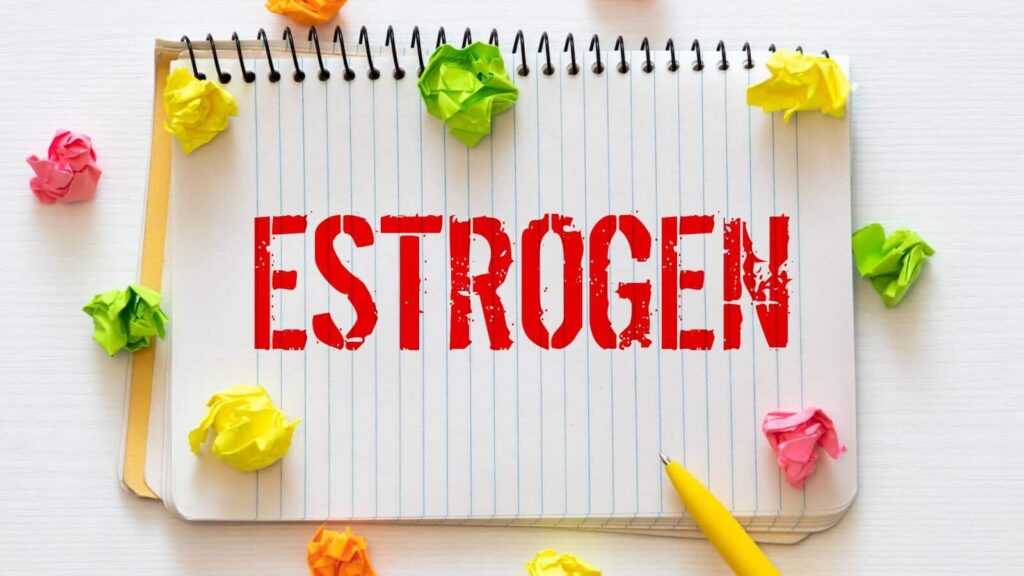
What Are Uterine Fibroids?
Uterine fibroids are small fibrous growths that grow from the wall of the uterus. They’re simply made up of smooth muscle and connective tissue. Since they can be found in different parts of the uterus, they’re diagnosed based on where the fibroids are located (see image below). They’re sometimes referred to as “tumors,” though be rest assured – they are never cancerous. Other names for uterine fibroids include “leiomyoma” and “myoma.”
Diagnosing uterine fibroids is very simple. While signs and symptoms are very helpful, you really need an ultrasound scan to see the presence of these muscular growths, their locations, and their size.
Its estimated that somewhere between 20% – 80% of women will develop a uterine fibroid by the time they turn 50 years old. While that is quite a big range, uterine fibroids are far from rare and its essential to know how to shrink them naturally. But first, what treatments are commonly used?
Common treatments for uterine fibroids consist of radiofrequency ablation and anti-hormonal drugs. Radiofrequency ablation is basically using heat waves to destroy the tissue without negatively affecting the surrounding tissue. Anti-hormonal drugs attempt to manipulate hormonal levels in an attempt to manage the fibroids growth. While these may provide relief in some form or another, neither of these options are truly addressing the cause of fibroids. We will explain why a little later as we talk about the best ways to shrink uterine fibroids. If you want to truly reverse the disease process, you have to address the cause of dysfunction.

Uterine Fibroid Signs & Symptoms
- Excessive bleeding during your period
- Excessive pain during your period
- A pressure sensation in your pelvis/lower abdomen
- Bleeding between periods
- Pain during intercourse
- Bloating during or around your menstrual cycle
- Low back pain
- Frequent urination
The True Cause Of Uterine Fibroids…

Estrogen Dominance
The TRUE cause of uterine fibroids is “Estrogen dominance.” Estrogen dominance is when estrogen levels become high in relation to progesterone levels. Since it is based on the relationship to one another, the problem could either be high estrogen (with normal progesterone) or normal estrogen with really low progesterone levels.
You need to discover if the estrogen is high and needs to be reduced, or if the progesterone is low and needs to be increased — or if there is a little bit of both occurring. Let’s discuss the estrogen side of things, then the progesterone side of things.
1. Detoxing Estrogens
Its primarily the liver’s job to detox estrogens. The good estrogens (2-OH estrogens) need to be broken down/detoxed once they have done their job and no longer needed. The bad (16-OH estrogens), ugly (4-OH estrogens) need to be broken down/detoxed simply because they’re toxic, not of benefit biochemically, and they just need to be detoxed. The liver breaks these down using one of 2 main pathways. The primary pathway being the glucuronic acid pathway which uses a number of nutrients such as artichoke, manganese, chromium, and a few others.
2. Reducing Estrogen Toxicities
While making sure estrogen detoxification is functioning well, its also important to remove the source of toxic estrogens as well. This includes plastics of any kind (xeno-estrogens), gut infections, blood sugar dysregulation, and birth-control medication. All of these are major contributors to the presence of toxic estrogens and need to be addressed if not completely avoided.
Progesterone
Many female hormonal imbalances occur due to low progesterone levels. Progesterone can become low due to 1 of 3 scenarios: (1) If progesterone is used up quickly by the adrenals, (2) if your body lacks the nutrients needed to make progesterone in the first place, or (3) if your thyroid function is poor.
1. Progesterone & The Adrenals
Progesterone can become deficient due to your adrenals using it to make more stress hormones. When our adrenals become stressed or “overworked,” they seek out other nutrients to make more stress hormones. Progesterone is a hormone that can be turned into cortisol when needed. Thus, if your stress hormones are commonly high, you may just be draining all of your progesterone hormones in order to support your adrenals. Remember if you body is under a lot of stress (mental, physical, or chemical), your adrenals will be kicking out more stress hormones. Obviously this can cause problems with our health, but when our body is in that stressed position, it is just trying to survive. In this case you have to focus on supporting the adrenals and regulating stress hormones.
In our office we check anywhere from 5-20 different nutrients to find the one that is going to help your adrenals the most. A whole form of Vitamin C (like Camu berries – NOT ascorbic acid), choline, Vitamin B2, Vitamin B3, and phosphorus are a few examples. An adaptogenic herb like Ashwagandha, Rhodiola, or Tulsi may be needed. Also very importantly, a proper functioning diaphragm and diaphragmatic breathing is also essential.
2. Progesterone & Nutrient Deficiencies
Progesterone can also become depleted due to a lack of proper nutrients. This can be a dietary problem or a malabsorption problem. One problem that I see commonly in practice is a Vitamin B2 (riboflavin) deficiency due to gut infections. Certain bacterias and fungi will feed on Vitamin B2 resulting in a B2 deficiency. This would be an example of malabsorption. An example of a dietary problem, however, would be if a patient is simply not getting enough Vitamin B3 (Niacinamide) or healthy fats (and cofactors) in their diet. If any of these needed nutrients are not present, your body will not be able to make enough progesterone. In this case, you have to focus on good dietary intake/nutrition and addressing anything depleting you of nutrients (infections and toxicities).
3. Progesterone & The Thyroid
Thirdly, poor thyroid function can cause problems with progesterone. A healthy thyroid system causes cells to be more sensitive to progesterone. If cells become more sensitive to progesterone, it will begin to take in and utilize whatever hormone is there–even if there is not much. Often times a good iodine supplement will help with progesterone sensitivity, however, always be careful when addressing anything thyroid-related. In this case, you have to focus on thyroid function overall.
Revisiting Common Treatments…
As mentioned previously, you have to address the estrogen dominance and the underlying causes in order to truly reverse uterine fibroids. Radiofrequency ablation may destroy the fibroids that are currently there, but it doesn’t change the fact that more will grow over time since the estrogen dominance issue is still present. That would be like constantly putting air in your flat tire without first removing the nail and patching the hole in it. You have to address the root issue.
The idea of using anti-hormonal drugs (like birth-control) is at least in the ball park as they attempt to address the high estrogen levels, however, even that is a band-aid approach and won’t work in the long run. In fact, it can actually make things worse in the long run. Birth control immediately affects a female’s thyroid hormone function resulting in functional hypothyroidism. Besides that, you still need to address the underlying causes such as infections, nutrient deficiencies, toxicities, and so on. If you address the underlying causes, and thereby address the estrogen dominance, you can begin to reverse uterine fibroids and prevent any new ones from ever growing.
Suffering From Uterine Fibroids?
At Freedom Health and Wellness, we address all of these things and more through a personalized and functional approach. We help people with chronic diseases and illnesses regain their health by getting to the source of their health concerns.
Have questions?
Dr. Miller offers a free zero-risk 15-minute consult to connect, address any questions or concerns you have, or discuss what care may look like! Just click the button below to schedule your free consult and Dr. Miller will look forward to talking with you!
Ready to partner together?
If you are looking for a doctor who is genuine, compassionate, and most importantly, able to help you, click below to schedule your first appointment. We are excited to see life-changing results with you!